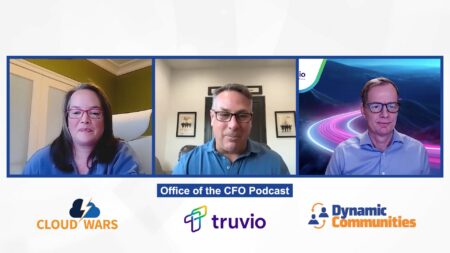As Marc Benioff’s company bears down on its first $5-billion quarter, will Salesforce become the first cloud-applications vendor to hit that mark?
I hate to do this to you, but the answer is… it depends.
I know, I know, that’s a dirty trick. I truly wish I could give you a clear answer one way or the other.
But with the way the cloud industry has evolved, such simplicity might be a thing of the past. And this matters a great deal, because the one-dimensional aspect of most cloud vendors has also become a thing of the past—and customers are better off for that.
So here’s why the I had to offer up the stinky answer of “it depends.”
1. Is Microsoft doing more than $5B in enterprise-cloud apps?
In its recent disclosure of its fiscal-Q4 numbers, Microsoft revealed that its enterprise-level cloud-apps business, Dynamics 365, generated about $1.8 billion in revenue for the Microsoft fiscal year ending June 30. So clearly Microsoft is only about one-third of the way on its journey to $5 billion in quarterly apps revenue, right?
Well, uh, it depends. It depends on whether you choose to consider the Office 365 revenue from the tens of millions of professionals who use it as “enterprise-apps” revenue. If you do, then Microsoft could well be above that $5-billion line in quarterly enterprise-apps cloud revenue.
So how big is Office 365 quarterly revenue? Well, we don’t know because Microsoft doesn’t disclose that number. So, um, it depends on what your guess is for Office 365 revenue.
2. Are the world’s leaders in enterprise apps, SAP and Oracle, at the $5B level in enterprise-cloud apps?
No they are not. Both companies have fast-growing cloud businesses and fast-growing cloud-apps businesses, but total quarterly cloud revenue for each company is just over $2 billion. And that includes non-apps revenue from platform, IaaS, etc.
3. So that clearly opens the door for Salesforce to become the first cloud-apps vendor to crack $5B in a quarter. Right?
Well—and say it with me!—it depends. It depends on a few things:
- While Salesforce is widely known for its hugely successful clouds—Service, Sales, Marketing, Commerce—it turns out that last quarter, Salesforce’s “Platform and Other” revenue category was bigger than that for any of its apps clouds. (You can read all about that in Salesforce Shocker: Its #1 Revenue Business Is “Platform and Other”.)
- So while it’s just about an absolute certainty that Salesforce will blow past $5 billion in quarterly revenue for the 3 months ended July 31, is it fair to call it an “apps company” if its biggest business unit is “platform and other”?
- Well, that depends on whether you choose to buy into the idea that there is “SaaS-oriented PaaS” and there’s “IaaS-oriented Paas.”
- And it further depends on whether you’re one of those people who believe that the traditional categories of IaaS, PaaS and SaaS are morphing and evolving to meet the needs of a marketplace that’s profoundly different from when those acronyms were cooked up in Silicon Valley 15 or more years ago.
What do I think? I think Salesforce deserves the recognition as the first cloud-apps vendor to top $5 billion in quarterly revenue. Its platform services are all intimately and almost inextricably tied to its cloud apps, and it has done as much or more than any company in the world to convince CEOs that it’s safe to move mission-critical apps to the cloud.
And with Salesforce scheduled to release its fiscal Q2 numbers of Aug. 25, we’ll all find out the juicy details in 2 weeks.
But: will those Q2 numbers impress you?
Well, that depends…
RECOMMENDED READING
Salesforce Shocker: Its #1 Revenue Business Is “Platform and Other”
Marc Benioff’s Secret Weapon: Tableau Turning Salesforce into Analytics Powerhouse
Marc Benioff Delivers: “The Best I’ve Ever Seen Salesforce Perform”
How Salesforce Plans to Beat Oracle and SAP While Scaling to $35 Billion
Marc Benioff: The Extraordinary Ascendancy of a Global Leader
Amid Wicked Competition with Salesforce, Adobe Enterprise Business Stalls
What Does Larry Ellison Know that Salesforce, ServiceNow & IBM Don’t?
Inside Amazon: 3 Reasons AWS Is No Longer Jeff Bezos’s Growth Engine
Google Remains Fastest-Growing Cloud Vendor, Thumping Microsoft, Amazon, IBM
Subscribe to the Cloud Wars Newsletter for in-depth analysis of the major cloud vendors from the perspective of business customers. It’s free, it’s exclusive and it’s great!








